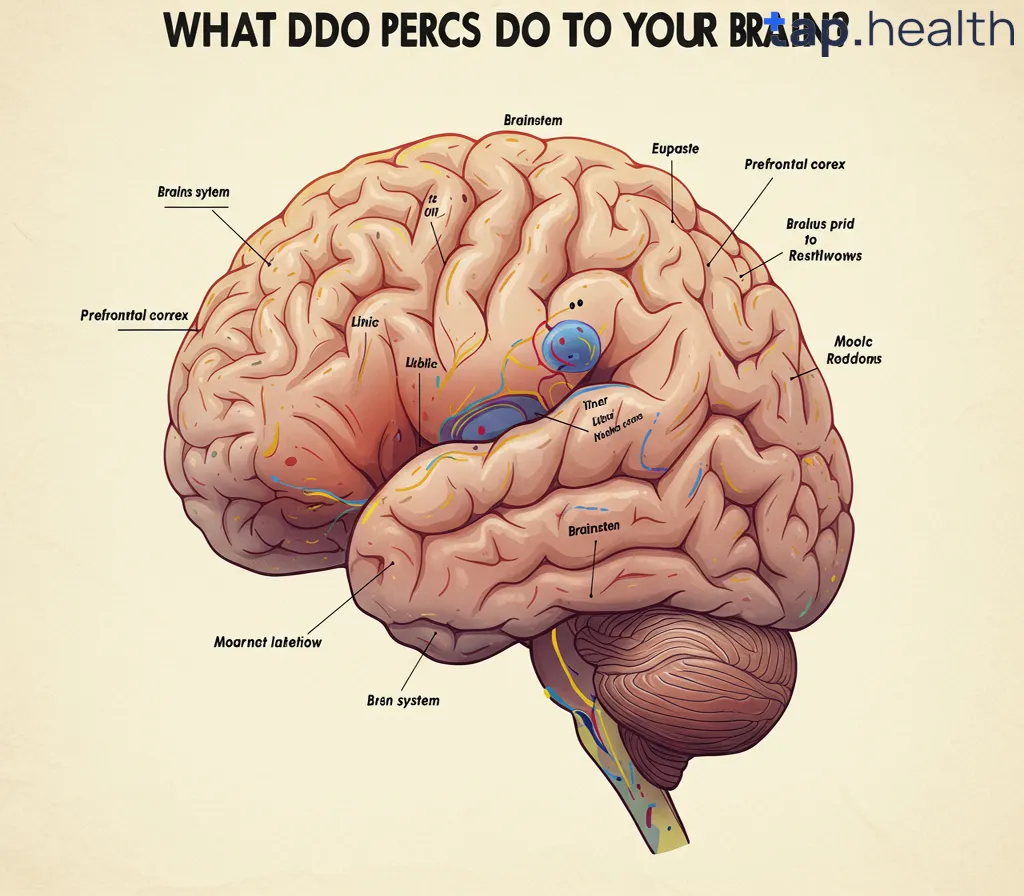Percs—short for Percocet—are one of the most commonly prescribed painkillers in the United States. Millions of people take them every year to manage moderate to severe pain, like after surgery or an injury. But behind the relief, there’s a serious question many people are asking: What do percs do to your brain?
This isn’t just curiosity. It’s a real concern. Whether you’ve been prescribed Percocet, know someone who takes it, or are just trying to understand the risks, it’s important to know how these pills affect your mind and brain.
In this article, we’ll break down everything about Percocet and the brain—how it works, what changes it causes, the risks of misuse, and how to protect your brain if you’re using it.
Let’s get into it.
What Are Percs (Percocet)?
Before we talk about the brain, let’s understand exactly what “percs” are.
Percocet is a brand-name prescription painkiller
Percocet is the brand name for a combination drug made of two main ingredients:
- Oxycodone – a powerful opioid painkiller
- Acetaminophen – a common over-the-counter pain and fever reducer (like Tylenol)
Oxycodone is the main ingredient that makes Percocet strong. It’s classified as an opioid, which means it works on the brain and nervous system to reduce pain signals.
Doctors prescribe Percocet for short-term pain relief, such as:
- After surgery
- Following a serious injury
- For dental pain
- During cancer treatment
But even when used as directed, Percocet can have strong effects on the brain. And when misused, those effects can be dangerous.
How Does Percocet Work in the Brain?
To understand what percs do to your brain, we need to look at how they interact with your body’s natural systems.
Percocet targets the brain’s opioid receptors
Your brain has special areas called opioid receptors. These are like tiny locks that certain chemicals—called neurotransmitters—can fit into. One of these natural chemicals is endorphins, which your body releases when you’re in pain or stressed. Endorphins help reduce pain and make you feel good.
Oxycodone (the opioid in Percocet) mimics endorphins. It fits into the same receptors in the brain and spinal cord, which:
- Blocks pain signals
- Triggers feelings of pleasure or relaxation
- Slows down breathing and heart rate
That’s why people often feel calm, sleepy, or even euphoric when they take Percocet.
The reward system gets activated
One of the most important parts of the brain affected by Percocet is the reward system. This system involves a brain chemical called dopamine.
When you do something enjoyable—like eating your favorite food or getting praise—your brain releases dopamine, which makes you feel good and encourages you to repeat that behavior.
Percocet causes a much bigger release of dopamine than natural rewards. This flood of dopamine is what creates the “high” people talk about. It’s also what makes Percocet so addictive—even when used as prescribed.
What Immediate Effects Do Percs Have on the Brain?
When you take Percocet, the brain reacts quickly. These are the short-term effects you might feel within minutes to hours.
1. Pain relief and relaxation
The main job of Percocet is to stop pain. It does this by changing how your brain processes pain signals. Instead of feeling sharp or intense pain, your brain receives dulled or blocked messages.
You may also feel:
- Calm
- Drowsy
- Warm and cozy
- Detached from stress
These feelings are why some people misuse Percocet—not for pain, but to escape emotional pain or stress.
2. Drowsiness and slowed thinking
Percocet slows down your central nervous system. This includes your brain activity.
Common side effects include:
- Feeling sleepy or groggy
- Trouble focusing
- Confusion or brain fog
- Slowed reaction time
This is why doctors warn against driving or operating machinery while on Percocet. Your brain isn’t as alert or quick as usual.
3. Mood changes and emotional numbness
Some people report feeling emotionally “flat” on Percocet. They don’t feel sadness, anger, or even joy as strongly.
This happens because opioids affect the parts of the brain that control emotions, like the amygdala and prefrontal cortex.
While this might seem helpful if you’re feeling anxious or upset, it’s not a healthy way to manage emotions. Over time, it can interfere with your ability to process feelings normally.
Can Percocet Change Your Brain Over Time?
Yes. Even short-term use can lead to changes in brain structure and function. The longer you take Percocet—especially at high doses—the more your brain adapts.
1. Tolerance: Your brain gets used to the drug
Tolerance means your brain stops responding to the same dose of Percocet. You need more of the drug to get the same pain relief or “high.”
This happens because:
- Opioid receptors become less sensitive
- The brain produces less of its own endorphins
- Dopamine levels drop when not on the drug
Tolerance can develop in just a few weeks, even with regular prescribed use.
2. Dependence: Your brain needs Percocet to feel normal
Dependence means your brain has adapted so much to Percocet that it can’t function normally without it.
If you stop taking Percocet suddenly, your brain goes into withdrawal. This causes symptoms like:
- Anxiety
- Insomnia
- Muscle aches
- Nausea
- Sweating
- Depression
Dependence is not the same as addiction, but it’s a major step toward it.
3. Addiction: The brain’s reward system gets hijacked
Addiction (also called opioid use disorder) happens when the brain’s reward system is taken over by the drug.
Signs of addiction include:
- Craving Percocet constantly
- Taking more than prescribed
- Using it to cope with stress or emotions
- Continuing use despite negative consequences
Brain scans of people with opioid addiction show real changes in areas responsible for decision-making, self-control, and impulse control.
Once addiction takes hold, it’s not just a “bad habit”—it’s a medical condition that changes how the brain works.
What Do Percs Do to Memory and Thinking?
Many people don’t realize that Percocet can affect memory, focus, and overall brain function—even in the short term.
1. Short-term memory problems
Studies show that opioids like oxycodone can interfere with working memory—the ability to hold and use information for short tasks.
For example:
- Forgetting what you were saying mid-sentence
- Misplacing items
- Difficulty following conversations
These effects are usually temporary but can be worse in older adults or people taking high doses.
2. Brain fog and poor concentration
“Brain fog” is a common complaint among Percocet users. It feels like your thoughts are slow, fuzzy, or unclear.
This happens because:
- Opioids slow down brain activity
- Sleep disruption (common with opioid use) affects focus
- Emotional numbness reduces motivation
Students, workers, and caregivers may find it hard to perform daily tasks while on Percocet.
3. Long-term cognitive decline (in heavy or long-term users)
Some research suggests that long-term opioid use may increase the risk of lasting brain changes, including:
- Reduced attention span
- Poorer problem-solving skills
- Increased risk of dementia (especially in older adults)
A 2020 study published in JAMA Neurology found that long-term opioid users had a higher risk of cognitive decline over time compared to non-users.
While more research is needed, the warning is clear: repeated use of Percocet can harm thinking skills.
How Do Percs Affect Mental Health?
Percocet doesn’t just change how you think—it can also change how you feel emotionally.
1. Increased risk of depression
Even short-term use of opioids has been linked to higher rates of depression.
Why?
- Opioids disrupt natural brain chemicals like serotonin and dopamine
- When the drug wears off, mood drops sharply
- Chronic pain (often the reason for taking Percocet) is already linked to depression
A study from the University of Wisconsin found that patients prescribed opioids for more than 30 days were three times more likely to develop depression.
2. Anxiety and panic
While Percocet may reduce anxiety at first, long-term use can actually make it worse.
When the drug wears off, people often feel:
- Restless
- On edge
- Panicky
This is part of withdrawal, even if you’re still taking the medication regularly.
Also, fear of running out of pills or needing higher doses can create a cycle of anxiety.
3. Emotional numbness and social withdrawal
Many people on long-term opioids report feeling “detached” from life. They lose interest in hobbies, relationships, and goals.
This emotional blunting can lead to isolation, which worsens mental health over time.
What Happens When You Mix Percs with Other Substances?
Mixing Percocet with other drugs or alcohol is extremely dangerous—and it hits the brain hard.
1. Alcohol + Percocet = Deadly combo
Both alcohol and Percocet slow down the central nervous system.
Together, they can cause:
- Extreme drowsiness
- Slowed or stopped breathing
- Loss of consciousness
- Death
Even one drink while on Percocet can be risky.
2. Benzodiazepines (like Xanax or Valium) + Percocet
These are anti-anxiety drugs that also slow the brain.
The CDC warns that mixing opioids with benzos increases the risk of overdose death by 10 times.
Both drugs suppress breathing, and together, they can shut it down completely.
3. Other opioids or sedatives
Taking Percocet with other painkillers, sleeping pills, or street drugs like heroin multiplies the danger.
The brain can’t handle the overload, leading to coma or fatal overdose.
Can Percocet Cause Permanent Brain Damage?
This is a serious question—and the answer depends on how it’s used.
In short-term, prescribed use: Usually no permanent damage
If you take Percocet as directed for a short time (like a few days after surgery), most brain changes are temporary. Once the drug is out of your system, brain function usually returns to normal.
In long-term or heavy use: Possible lasting effects
Studies suggest that chronic opioid use may lead to:
- Shrinkage in brain regions involved in decision-making and self-control
- Lower gray matter volume (which affects processing speed and memory)
- Persistent changes in dopamine function
A 2011 study from the University of California found that long-term opioid users had reduced brain structure integrity, especially in areas linked to motivation and emotion.
While the brain can heal to some extent after stopping use, full recovery may take months or years—and some changes may be permanent.
What Happens During Withdrawal? How the Brain Reacts
Stopping Percocet after dependence causes a storm in the brain.
1. The brain is “out of balance”
After relying on Percocet, your brain stops making its own painkillers (endorphins) and struggles to regulate mood and stress.
When the drug is removed, the brain is overwhelmed.
2. Withdrawal symptoms are brain-based
Common withdrawal symptoms include:
- Anxiety and panic (due to overactive stress systems)
- Insomnia (brain’s sleep cycle is disrupted)
- Depression (low dopamine and serotonin)
- Irritability and mood swings (emotional centers are unstable)
These aren’t just “feeling bad”—they’re signs of real brain changes.
3. Post-acute withdrawal syndrome (PAWS)
Some people experience symptoms for weeks or months after quitting, including:
- Trouble focusing
- Low motivation
- Emotional numbness
- Cravings
This happens because the brain takes time to relearn how to function without the drug.
How to Protect Your Brain When Taking Percocet
If you’re prescribed Percocet, you don’t have to panic—but you should be smart.
1. Use it only as prescribed
- Take the lowest effective dose
- Don’t take it longer than your doctor says
- Never crush, snort, or inject it (this sends a dangerous dose to the brain fast)
2. Avoid alcohol and other depressants
This is non-negotiable. Mixing increases the risk of brain damage and death.
3. Watch for signs of dependence
Early warning signs:
- Needing more to feel the same effect
- Feeling anxious when you’re low on pills
- Using it for reasons other than pain
Talk to your doctor if you notice these.
4. Ask about non-opioid pain options
There are safer ways to manage pain, such as:
- Physical therapy
- NSAIDs (like ibuprofen)
- Nerve pain medications (like gabapentin)
- Cognitive behavioral therapy (CBT) for pain
5. Don’t stop cold turkey
If you’ve been on Percocet for more than a few weeks, quitting suddenly can be dangerous.
Work with your doctor to taper slowly and safely.
Can the Brain Heal After Percocet Use?
Yes—your brain is resilient.
1. The brain can recover, but it takes time
After stopping Percocet, the brain begins to repair itself. Natural endorphin production returns, dopamine balance improves, and thinking skills get better.
Recovery time varies:
- A few weeks for short-term users
- Several months to a year for long-term users
2. Healthy habits speed up healing
You can help your brain recover by:
- Eating a brain-healthy diet (rich in omega-3s, antioxidants)
- Exercising regularly (boosts endorphins and blood flow)
- Getting quality sleep
- Managing stress (yoga, meditation, therapy)
- Staying socially connected
3. Therapy and support are powerful tools
Cognitive behavioral therapy (CBT), counseling, and support groups help retrain the brain to cope without drugs.
Many people fully recover and go on to live healthy, fulfilling lives.
What Are the Signs of Percocet Abuse?
Knowing the warning signs can save a life.
Behavioral signs:
- Taking more than prescribed
- “Losing” prescriptions to get more
- Doctor shopping (visiting multiple doctors for pills)
- Using Percocet to relax or escape
Physical signs:
- Extreme drowsiness
- Slurred speech
- Small (“pinpoint”) pupils
- Nausea or constipation
- Weight loss
Social signs:
- Withdrawing from family and friends
- Neglecting responsibilities
- Losing interest in hobbies
- Problems at work or school
If you see these signs in yourself or someone else, it’s time to get help.
How Is Percocet Addiction Treated?
Treating addiction is about healing the brain and body.
1. Medical detox
Under medical supervision, patients are slowly weaned off Percocet to avoid dangerous withdrawal.
Medications like buprenorphine or methadone may be used to ease symptoms and reduce cravings.
2. Medication-assisted treatment (MAT)
MAT combines medication with therapy. It’s one of the most effective ways to treat opioid addiction.
Medications help stabilize brain chemistry so patients can focus on recovery.
3. Counseling and therapy
Therapy helps patients:
- Understand why they used Percocet
- Develop healthier coping skills
- Repair relationships
- Prevent relapse
Common therapies include CBT, motivational interviewing, and group counseling.
4. Support groups
Groups like Narcotics Anonymous (NA) or SMART Recovery provide community and accountability.
Talking to others who’ve been through the same thing can be incredibly healing.
Frequently Asked Questions (FAQ) on What Do Percs Do to Your Brain?
What do percs do to your brain?
Percs (Percocet) affect the brain by binding to opioid receptors, blocking pain, and releasing dopamine. This causes pain relief, relaxation, and sometimes a “high.” Over time, they can lead to tolerance, dependence, memory issues, and changes in mood and thinking.
Can one Percocet change your brain?
One dose won’t cause permanent brain changes, but it does affect brain chemistry temporarily. It can still be dangerous, especially if mixed with alcohol or other drugs.
Do percs cause brain damage?
Long-term or heavy use of Percocet may lead to structural brain changes, especially in areas controlling decision-making and emotions. Short-term use as prescribed usually doesn’t cause permanent damage.
How long does it take for Percocet to leave your system?
Percocet typically leaves your system in 1–4 days, depending on dose, metabolism, and liver function. Oxycodone (the opioid) has a half-life of about 3–5 hours, but metabolites can be detected longer.
Can Percocet make you depressed?
Yes. Studies show that even short-term opioid use increases the risk of depression. This is due to changes in brain chemicals like dopamine and serotonin.
Is it safe to take Percocet every day?
Only if prescribed and monitored by a doctor. Daily use can lead to tolerance, dependence, and long-term brain changes. It should not be used long-term for chronic pain without careful evaluation.
What’s the difference between dependence and addiction?
Dependence means your body needs the drug to function normally (withdrawal happens if you stop). Addiction involves compulsive use despite harm, cravings, and loss of control. You can be dependent without being addicted, but dependence increases addiction risk.
Can you overdose on Percocet?
Yes. An overdose can slow or stop breathing, leading to brain damage or death. Signs include slow breathing, blue lips, unconsciousness, and pinpoint pupils. Call 911 immediately and use naloxone if available.
Does Percocet affect memory?
Yes. Percocet can cause short-term memory problems, brain fog, and difficulty concentrating. Long-term use may increase the risk of lasting cognitive issues.
How can I protect my brain while taking Percocet?
Use only as prescribed, avoid alcohol and other sedatives, watch for signs of dependence, and talk to your doctor about non-opioid pain options. Stay healthy with good sleep, diet, and exercise.
What helps the brain heal after Percocet use?
Time, abstinence, healthy living (diet, exercise, sleep), therapy, and support groups all help the brain recover. The brain is capable of healing, but it takes patience and effort.
Is it safe to stop Percocet cold turkey?
No. Stopping suddenly can cause severe withdrawal and health risks. Always taper under a doctor’s supervision.
Can teenagers’ brains be more affected by Percocet?
Yes. Teen brains are still developing, especially areas for decision-making and impulse control. Opioid use during adolescence can interfere with healthy brain development and increase addiction risk.
Final Thoughts: What Do Percs Really Do to Your Brain?
Percocet can be a helpful tool for managing severe pain—but it comes with real risks to your brain.
It changes how your brain processes pain, emotions, and rewards. It can lead to dependence, memory problems, mood disorders, and even long-term brain changes.
The key is awareness and caution.
If you’re prescribed Percocet:
- Use it only as directed
- Know the risks
- Watch for warning signs
- Talk to your doctor about safer options
If you or someone you love is struggling with Percocet use, help is available. Recovery is possible. The brain can heal. And with the right support, you can regain control of your mind and your life.
Your brain is your most important organ. Treat it with care.



